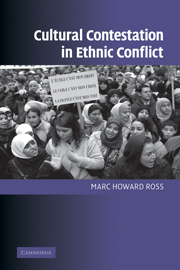Book contents
- Frontmatter
- Contents
- List of figures
- Preface
- 1 Introduction: easy questions and hard answers, what are they fighting about?
- 2 The political psychology of competing narratives
- 3 Narratives and performance: ritual enactment and psychocultural dramas in ethnic conflict
- 4 Loyalist parades in Northern Ireland as recurring psychocultural dramas
- 5 Where is Barcelona? Imagining the nation without a state
- 6 Digging up the past to contest the present: politics and archeology in Jerusalem's Old City
- 7 Dressed to express: Islamic headscarves in French schools
- 8 The politics of memory and memorialization in post-apartheid South Africa
- 9 Enlarging South Africa's symbolic landscape
- 10 Flags, heroes, and statues: inclusive versus exclusive identity markers in the American South
- 11 Culture's central role in ethnic conflict
- References
- Index
- Cambridge Cultural Social Studies
4 - Loyalist parades in Northern Ireland as recurring psychocultural dramas
Published online by Cambridge University Press: 22 September 2009
- Frontmatter
- Contents
- List of figures
- Preface
- 1 Introduction: easy questions and hard answers, what are they fighting about?
- 2 The political psychology of competing narratives
- 3 Narratives and performance: ritual enactment and psychocultural dramas in ethnic conflict
- 4 Loyalist parades in Northern Ireland as recurring psychocultural dramas
- 5 Where is Barcelona? Imagining the nation without a state
- 6 Digging up the past to contest the present: politics and archeology in Jerusalem's Old City
- 7 Dressed to express: Islamic headscarves in French schools
- 8 The politics of memory and memorialization in post-apartheid South Africa
- 9 Enlarging South Africa's symbolic landscape
- 10 Flags, heroes, and statues: inclusive versus exclusive identity markers in the American South
- 11 Culture's central role in ethnic conflict
- References
- Index
- Cambridge Cultural Social Studies
Summary
Marches are not simple political demonstrations in Northern Ireland. Rather they are emotionally charged, historical re-enactments of communal triumphs and suffering. The insistence on being allowed to march through the other's neighborhood reveals the territorial and defensive nature of marching.
(Farren and Mulvihill 2000: 31)Introduction
Protestant Loyal Order parades in Northern Ireland (introduced in Chapter 1) are contentious cultural performances that evoke the core narratives, and the intense emotions associated with them, for large parts of the Protestant and Catholic communities. Parades in Northern Ireland are an idiom of contestation serving as a forum both for demand making and for communication in the region's on-going conflict. These cultural enactments are political statements – provocations and challenges, rights claims, assertions of power, and public acts of commitment. As public performances in which central elements of the Protestant narrative are presented, parades foster widespread mobilization among participants, spectators, and opponents. “Parades are rituals of both celebration and commemoration: they are regarded as a celebration of culture, a demonstration of faith and a commemoration of past sacrifices. They are also displays of collective strength, communal unity and of political power” (Jarman 2003: 93).
Widespread participation and engagement in parades reinforces the relevance of the Protestant narrative and the immediacy of the conflict it describes to the many people directly involved, and many more that follow the related events. One loyalist website in Northern Ireland claims, “The Annual [July] Twelfth celebration in Ulster is the largest cultural festival in Europe.”
- Type
- Chapter
- Information
- Cultural Contestation in Ethnic Conflict , pp. 88 - 126Publisher: Cambridge University PressPrint publication year: 2007

